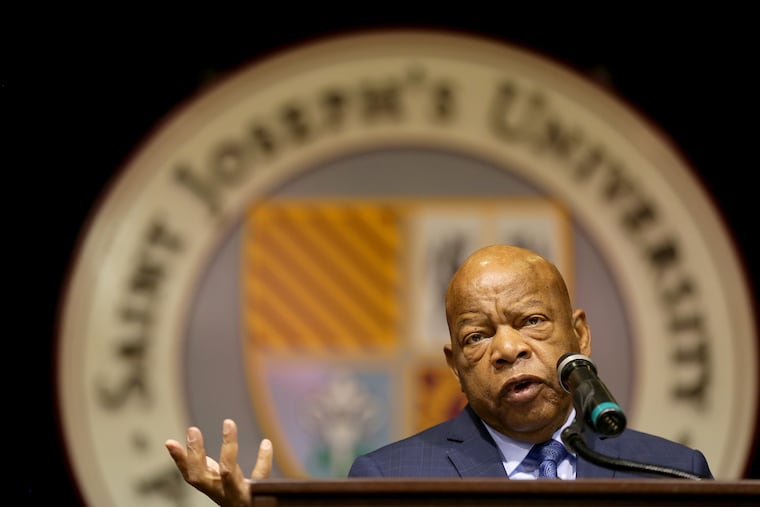John Lewis, in his own words, during visits to Philadelphia
John Lewis, the congressman and civil rights leader who died Friday, encouraged crowds large and small to continue pushing for racial equality during trips to Philadelphia in recent years.

John Lewis, the congressman and civil rights leader who died Friday, encouraged crowds large and small to continue pushing for racial equality during trips to Philadelphia in recent years. Here are excerpts from three speeches he gave in the region.
Camden: Sept. 19, 2016
In September 2016, Lewis came to Philadelphia to accept the prestigious Liberty Medal. The visit occurred shortly before the National Museum of African American History and Culture opened in Washington — an effort that Lewis championed.
Ahead of the award ceremony, Lewis spoke in Camden, where community advocates were pushing for historic recognition of a house where the Rev. Dr. Martin Luther King Jr. spent time. Haddon Heights activist Patrick Duff recalled on Saturday that he was stunned when Lewis joined his fight to preserve the home.
“Next Saturday, an African American museum is going to open on the Mall in Washington,” Lewis said. “I sponsored the legislation to get it passed. I went there a few days ago. I almost cried. You can feel the spirit of Dr. King there. You can feel the spirit of our ancestors in that museum.”
He encouraged the gathered crowd to “keep the faith”: “So I think it’s important for this city, for this state, and for our nation to save this local place, where Martin Luther King Jr. stayed while he was trying to get an education at Crozer Theological Seminary. ... I would love to come back here and visit when the marker is placed and this building is restored. It will be a day of jubilee.”
National Constitution Center: Sept. 19, 2016
That evening, Lewis was honored with the Liberty Medal at the Constitution Center. He told the audience that he never set out to win any awards:
“My plan wasn’t to seek fame or fortune. All I wanted to do is to help out. To do what I could to help make this country and the world community a little bit better, more just, a little more peaceful for all of its citizens. ... We were just ordinary people, but we had an extraordinary vision to live in a society that respected dignity and the worth of every human being. We wanted to build what we called — what Dr. Martin Luther King Jr. and others called — the beloved community. We truly believed that by refusing to comply with what was wrong, we could get our nation to do what was right.”
During those remarks, Lewis also invoked the promise of the Declaration of Independence:
“We overcame great distance, but we the people still have a great distance to go to fulfill the promise of a true democracy. Let the Declaration of Independence, fashioned by the founders of our great nation, right here in this city, the city of Brotherly Love, be our guide. Its beautiful words affirm the equality of all humanity. Let us continue to put aside, and push and pull, to protest and to dissent, and be prepared to struggle to move the society forward. ... We must stay in this struggle until we build a society based on simple justice.”
St. Joseph’s University: April 16, 2018
In a nearly 30-minute speech at St. Joseph’s in 2018, Lewis encapsulated the sweep of his life, from raising chickens on his family’s Alabama farm as a boy, to joining with King in the civil rights movement, to battling for immigration reform in his later years. He shared how he committed to nonviolent protest — inspired by the teachings of Jesus, Gandhi, and King — as the threat of arrest loomed:
“When I got involved in the sit-ins, we’d sit in there in an orderly, peaceful, nonviolent fashion, waiting to be served. And someone would come up and spit on us, put a lighted cigarette out in our hair ... pour hot water, hot coffee, or hot chocolate on us. Beat us.”
“We were told over and over again, if we continued to sit in, we would get arrested, we would be arrested. We would be taken to jail. And I thought about it, and I said, if we were going to be arrested, and go to jail, I wanted to look clean. I wanted to look fresh. ... I had very little money as a student. So I went to a used men’s store in downtown Nashville, Tenn., and bought a suit. I paid $5 for the suit. A vest came with it. And when I was first arrested, the first time, on February the 27th, 1960, I did look clean. I did look fresh. I did look sharp. And I tell you, my first arrest, I felt free. I felt liberated. I felt like I crossed over.”
Lewis closed that speech by reflecting on the assassinations of King in April 1968, and Robert Kennedy, killed two months later:
“If these two men had lived, our nation and our world would be better. All of us, each one of us, have an obligation, a mission, and a mandate, to pick up where Dr. King and Robert Kennedy left off. We can do it, and we must do it. So hang in there. We have miles to travel. We have to save our country, save our democracy. I wish each and every one of you well. May God bless you and may God keep you.”
Correction: This story has been updated to correct the location of Lewis’s family’s farm. It was in Alabama.